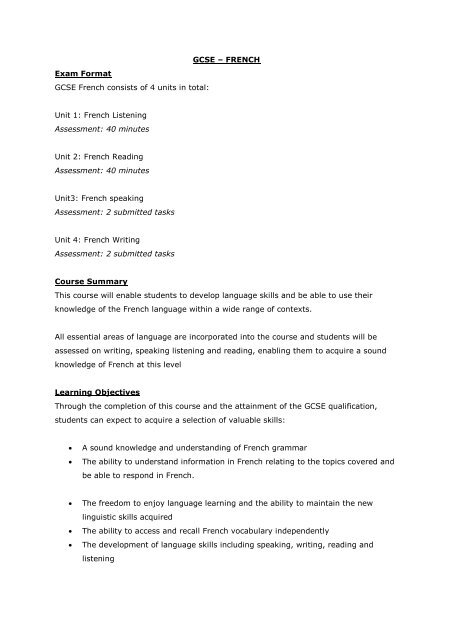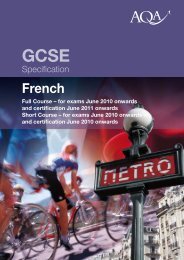gcse french.pdf - Nightingale Academy Revision
gcse french.pdf - Nightingale Academy Revision
gcse french.pdf - Nightingale Academy Revision
- No tags were found...
Create successful ePaper yourself
Turn your PDF publications into a flip-book with our unique Google optimized e-Paper software.
Exam Format<br />
GCSE French consists of 4 units in total:<br />
GCSE – FRENCH<br />
Unit 1: French Listening<br />
Assessment: 40 minutes<br />
Unit 2: French Reading<br />
Assessment: 40 minutes<br />
Unit3: French speaking<br />
Assessment: 2 submitted tasks<br />
Unit 4: French Writing<br />
Assessment: 2 submitted tasks<br />
Course Summary<br />
This course will enable students to develop language skills and be able to use their<br />
knowledge of the French language within a wide range of contexts.<br />
All essential areas of language are incorporated into the course and students will be<br />
assessed on writing, speaking listening and reading, enabling them to acquire a sound<br />
knowledge of French at this level<br />
Learning Objectives<br />
Through the completion of this course and the attainment of the GCSE qualification,<br />
students can expect to acquire a selection of valuable skills:<br />
• A sound knowledge and understanding of French grammar<br />
• The ability to understand information in French relating to the topics covered and<br />
be able to respond in French.<br />
• The freedom to enjoy language learning and the ability to maintain the new<br />
linguistic skills acquired<br />
• The ability to access and recall French vocabulary independently<br />
• The development of language skills including speaking, writing, reading and<br />
listening
• The acquisition of a new understanding of French culture and its language in a<br />
variety of contexts<br />
The Course<br />
This course is designed to be modern and eclectic in its approach.<br />
Diverse characters are introduced who are representative of Parisian life. These<br />
personalities are created to engage the student’s initial interest according to AQA<br />
syllabus 4658 specification II `engaging context’<br />
The characters are encountered initially in a famous restaurant in Paris, St Germain des<br />
Prés. `les deux magots’<br />
The setting is a familiar one that all students will be able to relate to and appreciate.<br />
The function of the characters is to introduce: - new vocabulary and gradually grammar<br />
and tenses appropriate to the level.<br />
The newly acquired linguistic knowledge is then reinforced with a selection of grammar<br />
exercises.<br />
The characters circulate throughout Paris returning to `les deux magots’ to discuss their<br />
lives and progress. The focus being on a situational syllabus.<br />
As the course progresses and the students linguistic competence is consistently<br />
improving. An extensive variety of texts will be introduced with comprehension<br />
questions, discussion and grammatical analysis.<br />
The level of fluency demonstrated in discussion will depict the student’s actual level of<br />
attainment in the language.<br />
The course will culminate in the student being offered the opportunity to write an<br />
extended essay on one of 2 topics. This will be suitable preparation for the examinations.<br />
Course Content<br />
Unit 1: French Listening<br />
The test will be pre-recorded using native speakers. Only material which is appropriate<br />
to the spoken language will be used in the tests. Each item will be heard twice.
Students’ comprehension will be tested by a range of question types, normally requiring<br />
non-verbal responses or responses in English.<br />
Students will be allowed to make notes during the test. Students will be given 5 minutes’<br />
reading time at the beginning of the test, before the recording is played, to give them<br />
time to read the questions.<br />
Unit 2: French Reading<br />
Only material which is appropriate to the written language will be used in the test.<br />
Students’ comprehension will be tested by a range of question types, normally requiring<br />
non-verbal responses or responses in English.<br />
The test will contain items common to those in Foundation and also material which will<br />
include some complex, unfamiliar language in a range of registers, together with nonfactual<br />
and imaginative material including narrative. Students will be expected to use<br />
their knowledge of grammar and structure in demonstrating understanding of specific<br />
points and of gist/the main message.<br />
They will also be expected to recognise points of view, attitudes and emotions and to<br />
draw conclusions.<br />
Unit3: French speaking and Unit 4: French Writing<br />
Students will complete two controlled assessment tasks. These tasks are untiered.<br />
Differentiation is by outcome, not by task. These may be drawn from the exemplar tasks<br />
we provide or they may be adapted by teachers for their students<br />
Both tasks will be in the form of a dialogue. The tasks will be marked by the teacher and<br />
submitted to AQA for moderation. The work of individual students may be informed by<br />
working with others but they must provide an individual response. Students must not<br />
submit the same task for Speaking and Writing.<br />
Summary of Assessments<br />
Unit 1: French Listening Assessment<br />
• 20% marks<br />
• 40 minutes<br />
• Exam available from June 2010
Unit 2: French Reading Assessment<br />
• 20% marks<br />
• 40 minutes<br />
• Exam available from June 2010<br />
Unit 3: French Speaking Assessment<br />
• 30% marks<br />
• 2 submitted tasks<br />
Unit 4: French Writing Assessment<br />
• 30% marks<br />
• 2 submitted tasks<br />
Assignment Information<br />
Throughout the course there will be self-assessment questions, and tutor marked<br />
questions, to enable students to monitor their progress.<br />
As you work through the course, take time to complete the activities as this will give you<br />
a greater understanding of the subject matter and allow you to practice your new found<br />
knowledge.<br />
These activities do not have to be submitted as they are for your own study.<br />
You should complete your tutor marked assessments as you go through the subject topic<br />
and then submit your completed assignment at the end of every completed subject topic<br />
e.g.: when you have completed the section on Unit 1, section 1, you should complete the<br />
corresponding questions and then submit to your tutor for marking and feedback.<br />
You will find your tutor marked assignment questions at the end of every unit topic.<br />
When you commence the course please contact your tutor to arrange your telephone<br />
tutorial sessions as soon as possible.<br />
Recommended Reading:<br />
Collins Easy Learning French Dictionary (Easy Learning Dictionary) (Paperback)<br />
Publisher: Collins; 4th Revised edition (25 April 2007)
Language English<br />
ISBN-10: 0007253494<br />
ISBN-13: 978-0007253494<br />
AQA GCSE French Higher Student Book<br />
By Oliver Gray), Steve Harrison, M T Bougard, Jean-Claude Gilles, Ginny March<br />
Publisher: Nelson Thornes (29 Jun 2009)<br />
ISBN-10: 1408504243<br />
ISBN-13: 978-1408504246<br />
Expo AQA GCSE French Higher Student Book, 2nd edition by Clive Bell, Rosi McNab<br />
Publisher: Heinemann; 2nd edition (23 Mar 2009)<br />
ISBN-10: 0435720600<br />
ISBN-13: 978-0435720605<br />
The Essentials of AQA GCSE French by S. Harrison<br />
Publisher: Lonsdale <strong>Revision</strong> Guides (30 Nov 2004)<br />
ISBN-10: 1903068975<br />
ISBN-13: 978-1903068977<br />
Additional Materials<br />
Although no additional course materials are required, students may find it helpful to use<br />
extra resources such as GCSE French textbooks or other sources to supplement their<br />
learning.<br />
A voice-recording machine such as a tape recorder or Dictaphone will be required to<br />
complete some parts of the assessment.<br />
Support<br />
As a student of UK Open Learning you will have access to tutor via email who will mark<br />
your work and guide you through the course to ensure you are ready for your<br />
examinations.<br />
Examination Centres<br />
UK Open Learning will provide you with a list of examination centres but it is entirely<br />
your responsibility to find a centre which will accept you as an external candidate.<br />
In some cases you should be prepared to travel to another town or city to take your<br />
exams.
The contract for sitting exams is between you and the centre and we will provide you<br />
with comprehensive instructions on when and how to deal with the examination centre.<br />
Please email for a list of centres and we will provide you with a link or a PDF for you to<br />
contact centres directly. We are unable to provide this information by telephone<br />
Entry Requirements<br />
Basic English reading and writing skills<br />
Pre-requisites<br />
None<br />
Qualification<br />
GCSE in French<br />
Language of Examination<br />
Units are provided in English only<br />
Frequently Asked Questions<br />
Q. Do your courses meet the latest syllabus changes?<br />
A. yes, all our course materials meet any changes and will be updated free of charge if<br />
further changes are made.<br />
Q. Why do I have to find a centre myself?<br />
A. We have students all over the UK and Europe and it is impossible for us to arrange<br />
dates and times for individual students.<br />
Q. What if I cannot find an examination centre?<br />
A. If you wish to gain the qualification then be prepared to travel it is worth it!<br />
Q. How much are exam fees?<br />
A. These vary from centre to centre but as a guide they are around £50<br />
Q. Are the courses paper based or on-line?<br />
A. All our courses are paper based and come in attractive sturdy folders.<br />
Q. How do I contact my tutor?
A. Tutors are all working Teachers or Lecturers so contact is by email only.<br />
Q. Why can I not take my exams at when I have completed the course and have to<br />
wait?<br />
A. Exams are taken at the same times as schools and colleges and are not flexible.<br />
Q. I want to take my exams but there are only a few months to study, is this possible?<br />
A. Depending on the time of year, it is sometimes impossible to complete your studies in<br />
a short space of time as your work has to be marked and checked. More importantly the<br />
examination boards have cut off times which are not flexible.<br />
Visit http://web.aqa.org.uk/admin/p_private.php<br />
CODE PRICE INSTALMENTS<br />
GC17 £324 6 Months at £54.00<br />
Pay in full at the time of ordering<br />
and you will receive the 10% discount<br />
(deducted at checkout)



